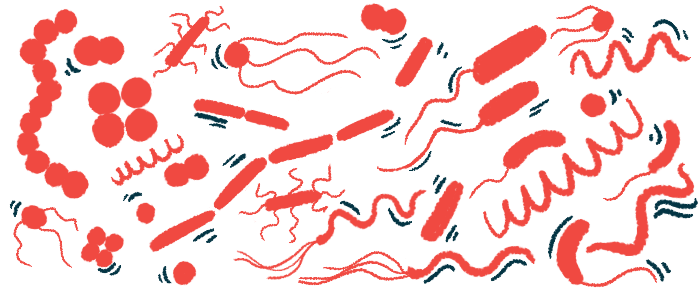Anti-inflammatory Medications in CF May Help Reduce Lung Bacteria
Study: Immune signaling proteins vary with different airway bacteria
Written by |

A new study suggests that the use of anti-inflammatory medications to modulate immune signaling proteins in people with cystic fibrosis (CF) may potentially reduce bacteria and avoid antibiotic resistance.
Researchers found that different bacteria in the airways of CF patients induced the release of varying signaling proteins, called cytokines, which lead to inflammation.
These findings could prove “extremely helpful” in treating patients, according to the team, though they stressed that further study is needed.
“Anti-inflammatory drugs can be used in addition to established therapeutic ways to modulate inflammatory or anti-inflammatory cytokines, modulate the repercussions of CF disease, and even reduce bacteria without causing antibiotic resistance, according to these findings,” they wrote.
The study, “Cytokine patterns in cystic fibrosis patients with different microbial infections in oropharyngeal samples,” was published in the journal Cytokine.
Chronic lung infections are a common complication in CF, a genetic condition characterized by the buildup of thick mucus in the lungs and other organs. Two of the most common bacteria found in the lungs of CF patients are Pseudomonas aeruginosa and Staphylococcus aureus.
Because of the ongoing colonization of bacteria in the airways, the local immune cells continuously produce cytokines — small proteins that control the growth and activity of other immune cells.
Some cytokines, such as TNF-alpha and interleukin-6 (IL-6), promote an inflammatory response, while others, like IL-10, have anti-inflammatory effects.
Investigating cytokines in CF
Understanding cytokine production in response to different infectious agents, to detect pro- and anti-inflammatory patterns, may aid in the therapeutic management of chronic lung infections in people with CF and avoid resistance to standard antibiotics.
To learn more, researchers in Iran collected blood and sputum samples from 60 CF patients — 26 females and 34 males — with a mean age of 10.9 years. A group of 10 healthy controls, with a mean age of 14.4 years, was included as a comparison.
Bacteria were cultured and identified from sputum samples, and cytokines were measured in blood samples or immune cells collected from blood. S. aureus bacteria were the most common bacterial species found in patients (40%), followed by P. aeruginosa (18.3%).
Blood tests showed that, compared with controls, CF patients who tested positive for P. aeruginosa had significantly higher levels of anti-inflammatory IL-10, as well as IFN-gamma — which activates immune cells — and IL-4, a stimulator of immune B-cells. The pro-inflammatory cytokine IL-17 was significantly lower in the blood of these patients.
IL-10, IL-4, and IFN-gamma also were substantially higher in S. aureus-positive CF patients. No differences were seen in the cytokine profile across all participants with normally-occurring bacteria, except for IL-4 and IFN-gamma, which were significantly higher in CF. A comparison of cytokine levels based on fully isolated microorganisms was consistent with these findings, the researchers noted.
Measurements of other blood parameters found CF patients who tested positive for P. aeruginosa infection had reduced mean red blood cell size and a lower mean amount of red blood cell hemoglobin, the protein that carries oxygen. These patients also had higher levels of white blood cells and platelets. No notable differences in blood parameters were observed with S. aureus or normal bacteria.
A statistical analysis found a significant correlation between white blood cell count and the levels of IL-10 and IL-17 in patients with P. aeruginosa. As white blood cell count increased, Il-17 was higher, and IL-10 was lower.
Likewise, as IL-17 increased, immune neutrophil cells also increased, whereas when IL-17 decreased, there was a rise in immune eosinophil cells. Higher IFN-gamma also correlated with elevated immune basophil cells.
In S. aureus-positive patients, IL-4 dropped with an increasing amount of immune monocytes. Higher TGF-beta correlated with more red blood cells and basophils, and IL-17 levels matched with platelet counts.
Higher red blood cell count was related to lower IL-4 levels in those with normal microbe samples. Lastly, a decrease in TGF-beta was associated with an increased mean red blood cell size.
“Our findings reveal that different microbial agents induce different cytokines in CF patients,” the researchers wrote.
The team said this group of patients “deserves additional attention,” as those with “P. aeruginosa, less invasive bacteria like S. aureus, and even normal microbiota are exposed to cytokine and blood factors alterations and illness severity.”
However, “evaluating those findings necessitates clinical and laboratory investigation to determine the impact of anti-inflammatory medicines on cytokines amount and disease severity,” the researchers concluded.







